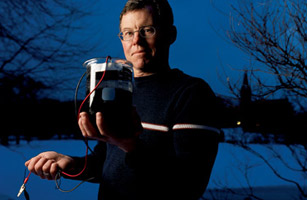
The Massachussetts researcher with a beaker full of sediment containing Geobacter, microbes that can generate electricity as they break down pollutants.
Derek Lovley
Clean and dry is not an interesting environment for Derek Lovley. As a boy, he always wanted to go where he might get wet. Growing up in northwest Connecticut, he worked summers as a lifeguard and briefly considered a career monitoring streams. So even though his work in environmental microbiology kept him indoors, when it was time to open his own lab in 1995, he chose to do so at the University of Massachusetts in pastoral Amherst, turning down more prestigious Ivy League suitors so that he could have a better prospect of getting his boots muddy.
Lovley's dual pursuits of scientific exploration and natural surroundings led him straight to the discovery of a group of remarkable microbes he named Geobacter, which breathes rust instead of oxygen, thrives in polluted earth and can even generate electricity. When Lovley first found Geobacter in silt beneath the Potomac River in 1987, he had no idea how capable it was. "I never thought it would go this far," says Lovley. "But Geobacter can do so many things."
Geobacter's secret is its unique metabolism: the microbes expel electrons outside their cell walls without needing to convert them to water, as human cells do. Geobacter needs only an outside compound — usually iron oxide, or rust — to accept the excess electrons. Lovley discovered how to coax Geobacter into not only dumping electrons onto uranium waste but also consuming petroleum by-products. Geobacter has already effectively decontaminated a uranium mine in Colorado and an oil spill in Minnesota.
But Geobacter has an even more remarkable talent. Just as the microbes can give electrons to iron, they will gladly donate them to an electrode, which creates an electrical current. Navy researchers first observed "electrified" sea muck in 2000. From this, Lovley's lab has corralled Geobacter into sediment batteries that could be powering battlefield electronics within a year.
Lovley's unyielding faith in the microbe's potential, along with financial backing from the Department of Energy and the military think tank darpa, has expanded his lab from five scientists to more than 50 today. Daniel Bond, who has won accolades for his work in Lovley's lab, says his colleague's creativity comes from an ability to straddle different disciplines in his work. Says Bond: "Derek really appreciates a good unsolved problem." And the rest of us can appreciate Lovley's ingenious answers.